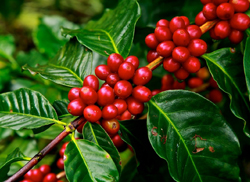
Dr Mathenge says value addition earns him more and creates employment. He encourages fellow farmers to follow his example.
On the Marua-Nanyuki road, a few kilometres to the Kiganjo Police Training College gate, is the popular Brade Gate Coffee shop stop over.Here, travellers enjoy a hot cup of coffee. But this is not your usual cup of coffee. It is 100 per cent organically and locally produced. In fact, the farm where the coffee is grown and processed it is a walking distance from the shop.
Guests from all walks of life stop over here, each ordering their favourite form of coffee; some have it black, others white, others order cappuccino, espresso among other types Others buy packed coffee to take away.
Dr Thuo Mathenge, the chairman and founder of Brade Gate Food Industries decided to break the norm and process his own coffee. The path that leads to his home and coffee farm is not decorated with your usual, well-manicured flowers. Instead, Dr Mathenge has planted Batian coffee trees. He looks at these trees with a smile, analyzing how much they have fruited, and the fact that their fruits will soon be consumed by his customers.
From the factory, you can easily see Dr Mathenge’s 30-acre coffee farm, across the valley. The picking season starts in about three months. Soon, the factory will be a beehive of activity processing red cherries. The process starts with picking the ripe cherries, which are red in colour. The outer skin is then removed. This process is known as pulping. The parchment (inner beans), is then washed before being sun-dried.
The outer skin is recycled as manure. The manure from red cherries is complemented with more sourced from the company’s poultry farm. The second stage of coffee-processing is hulling. This entails removal of the parchment skin.
An innovative Mathenge does not waste the husks that are mechanically removed at this stage. They are mixed with soil to make briquettes, which are used as ‘charcoal’ for cooking at his hotels and for sale. The whole huller is locally made except for the mortar, which Mathenge imported from China. After hulling, the beans are roasted. The roasting machine looks like a big cylindrical drum, suspended in an aerated and lit room.
It is comprised of the outer part, which was made at the nearby Dedan Kimathi University, while the roaster is imported from Germany.
Ephraim Maina, the company’s Processing Manager, explains that coffee is roasted either at medium, or dark levels. Medium is for those who love mild-concentrate coffee, while dark is for those who prefer highly concentrated coffee.
“To produce the medium roast coffee, the beans are roasted for 10-12 minutes at 250 degrees centigrade, while dark roast is achieved after roasting beans for 10-15 minutes at 300 degrees centigrade,” explains Maina.
The sweet aroma in the roasting room is so inviting that it whets one’s craving for a hot cup of coffee. After roasting, the coffee is then grinded by use of an electric grinder imported from India.
The finished product is then packaged in various measures, ready for the market. Usually, coffee farmers deliver their produce to the factories, where the berries are only processed up to the parchment stage before being sent for auctioning.
So why did Mathenge decide to process his own coffee? He says adding value to coffee earns him more money and also creates employment for local youths. At the age of nine years, Mathenge recalls, he would walk for eight kilometers to Kiganjo, where he worked at a quarry to help his mother, who was a small-scale coffee farmer, raise money for basic needs.
“That was when I decided that one day, I would make coffee as lucrative agribusiness so that I would create employment for parents, and therefore not watch as young boys do menial jobs like I did in my childhood,” he said. The medical doctor said he had considered putting up a hospital, ‘’but again, I thought this would offer limited opportunities compared to agribusiness”.
He started processing coffee two years ago. However, to produce 100 percent organic coffee beans, he had to first plant trees, and leave them to fruit for two years, so that they would withstand all diseases and finally develop resistance.
Most of the coffee is sold as a beverage in the company’s 20 outlets located in Nyeri, Nakuru, Thika, Meru, Nairobi among other major and towns. Dr Mathenge encourages more coffee farmers to venture into value addition. This, he adds, will economically empower them and lift them from the poverty that afflicts them. It will also create jobs for their children.
He says county governments in coffee-producing areas should put emphasis on promoting this cash crop as a way of enhancing development.
Besides, he adds, there is a ready market locally for Kenyan coffee as the coffee-drinking is increasing. He only processes coffee from his farms, saying this way, he is able to have assured quality control. He advises small scale farmers to team up to set up their own factories to add value to their coffee.
